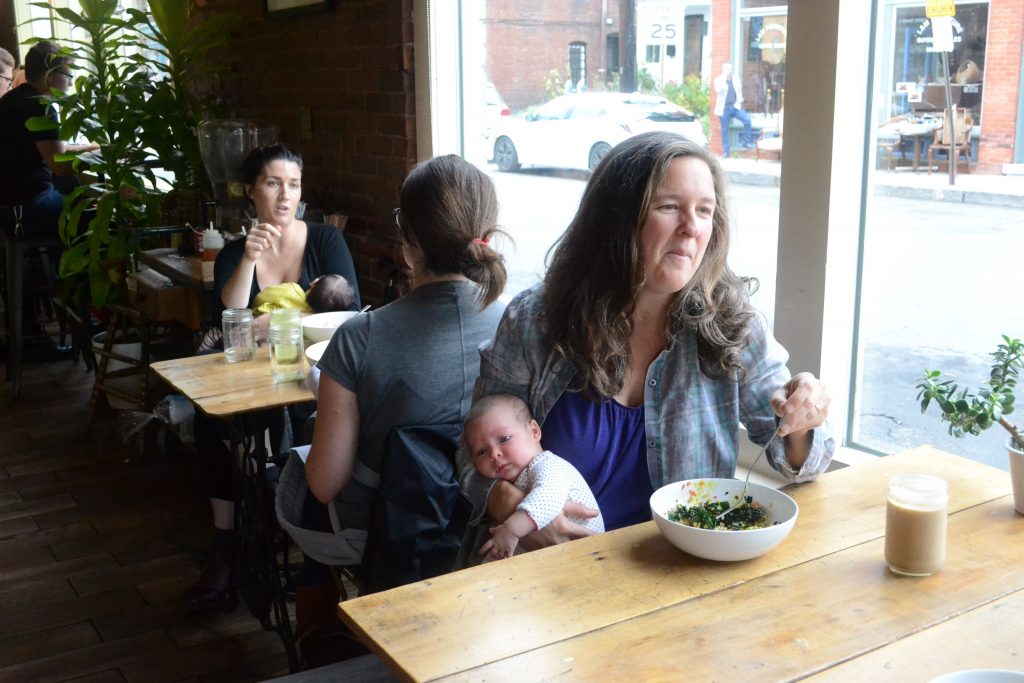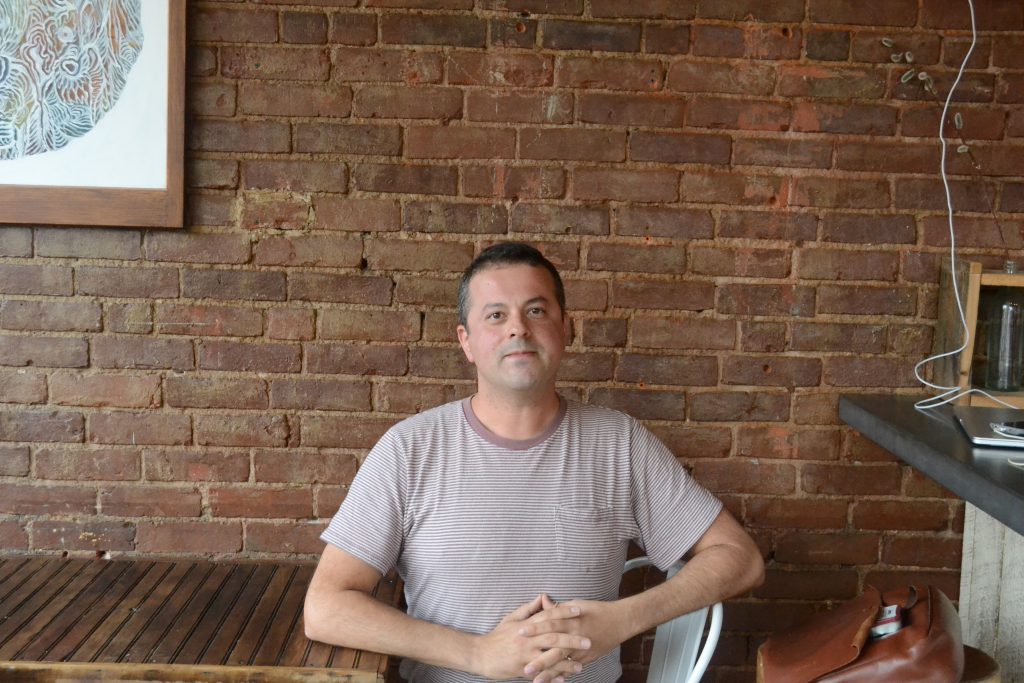Madeleine Vanstory was visiting her sister, Melissa Redwin of Westhampton, when they decided to come to Nourish Wellness Cafe in Northampton for lunch with Melissa’s newborn, Lucena.
“I finally made the connection, after decades of bad eating, (between) how you nourish your body with food and how you feel,” said Vanstory, a physician and health consultant in Oregon. “And I just know that I feel better when I eat things that require the sun to grow. I just feel lighter and brighter.”

Melissa Redwin eats lunch at Nourish Wellness Cafe in Northampton with her baby Lucena. Meg Bantle photo
“That happiness shows up in a balanced state of being,” Redwin added. “My blood sugar’s not going way up and way down, my energy’s not going way up and way down. (I) just feel much more balanced in daily life.”
Nourish has an organic, local, and vegetarian menu that also features fermented foods. Fermented, live-culture foods, like sauerkraut and kombucha, are some of the most popular health-food products available today, but why all the fuss? As it turns out, the human body is full of microbes, collectively called the microbiome, and eating and drinking live-culture products can positively influence the microbiome, which then has far reaching effects on overall wellness.
“We have a tendency of thinking of bacteria as bad,” said David Sela, assistant professor in the food science department at UMass Amherst. “You know, keeping things sterile so that we don’t get sick from bad bacteria. But, in actuality, most bacteria don’t cause diseases, and what we’re finding out right now is that many of them are beneficial.”
The power of a healthy and diverse microbiome is still not fully understood, but research turns up new insights every day. So far, scientists have found that the microbiome may affect a wide range of body processes, from metabolism to immune system to mental health. Sela explained that, while a relationship between our brain and our guts (the “brain-gut axis”) has been known about for a long time, the interactions between neural tissue and the microbiome is a whole new area of study, meaning that a healthy microbiome could improve mood and stave off depression.
“Our microbes inside of us are actually making neurotransmitters and neurotransmitter-like molecules that are interacting with neural tissue in our guts,” Sela said. “So that old saying, ‘I have a gut feeling’; There might be some truth to that.”

David Sela, assistant professor in the food science department at UMass Amherst, in Nourish Wellness Cafe in Northampton. Meg Bantle Photo
The gut microbiome is essentially a newly discovered organ, and researchers are just starting to discover how the rest of the body interacts with it. Each person’s microbiome is as unique as a fingerprint and starts to develop at birth. An infant can receive new microbes from the birth canal, breast milk, and the child’s early environment.
Redwin is currently breastfeeding Lucena, and although many people know that there are benefits to breastfeeding, what many people might not realize is that some of the sugars in breast milk indicate something fundamental about the importance of the human microbiome. Sela focuses his research at UMass on this very topic. He explained that breast milk contains a unique sugar that the infant’s body does not break down, but that is seemingly only present to support and feed the blossoming microbiome in the baby.
“There is an evolutionary aspect of that, that we have microbes that are being supported by breast milk,” Sela said. “Mom makes breast milk at a severe energetic cost to her. So, if you’re spending all that energy, why is that the case? We actually have a lot of evidence that it’s purposeful, that it evolved to benefit infant health early on and to propagate our species. We are trying to mine that interaction so that we find fundamental truths about our species’ nutrition.”
Sela’s research suggests that human breast milk has evolved to benefit the microbiomes in infants. Knowing that our microbiomes have been favored by evolution means keeping microbiomes healthy is important, researchers have found. Having a healthy microbiome at all stages of life carries a wide range of benefits, including digestive ones, like improving the bioavailability of nutrients and reducing symptoms of lactose intolerance, and other, less obvious ones, like decreasing the risk of certain cancers and improving the immune system. A healthy microbiome is important to health, but what does a healthy microbiome look like?
“In this line of research there are very few absolutes, but one thing that is generally agreed upon is that increased diversity tends to be better,” Sela said. “Take a look at ecological concepts, or in agricultural practices. With monoculture agriculture we see certain difficulties and challenges, and the same thing happens in our gut. If we happen to have … decreased diversity, that could lead to certain pathologies, certain disease states.”
A healthy microbiome is full of diverse microbes, which is why eating a variety of probiotic foods and drinks is beneficial. They add to the diversity of the microbiome, or at the very least interact with the microbes that people already have to produce new results. Luckily for people living in the Pioneer Valley, there is no shortage of live-culture products locally. Companies like the Artisan Beverage Company, Real Pickles, Hosta Hill, and Sidehill Farm all sell probiotic products that people love for the taste and for the health benefits.
There are also ways that we reduce microbiome diversity. Overusing antibacterial products and eating a diet that is high in fat and carbohydrates can both result in fewer helpful microbes. We also take antibiotics to kill bacteria that are making us sick, but antibiotics can’t tell the difference between good microbes and bad microbes, so our microbiome diversity declines. Even many toothpastes have an ingredient, called tricolsan, that is intended to kill microbes in the mouth, but may have unintended, negative consequences.
“What happens when you swallow a little bit of it? What does that do to your gut microbiota?” Sela asked. “We’re not quite sure, but intellectually, if we’re trying to knock down microbes in one context, well why wouldn’t they knock down microbes in another context? And is that something that is of benefit or is it a bad thing?”
By consuming products that have live-cultures, like yogurt, fermented sauerkraut, or kombucha, people can help their microbiome to stay diverse and healthy, which will keep their immune system strong, their intestinal tract healthy, and potentially benefit their body in ways that scientists have not yet discovered.
Meg Bantle can be reached at meganbantle@gmail.com.




